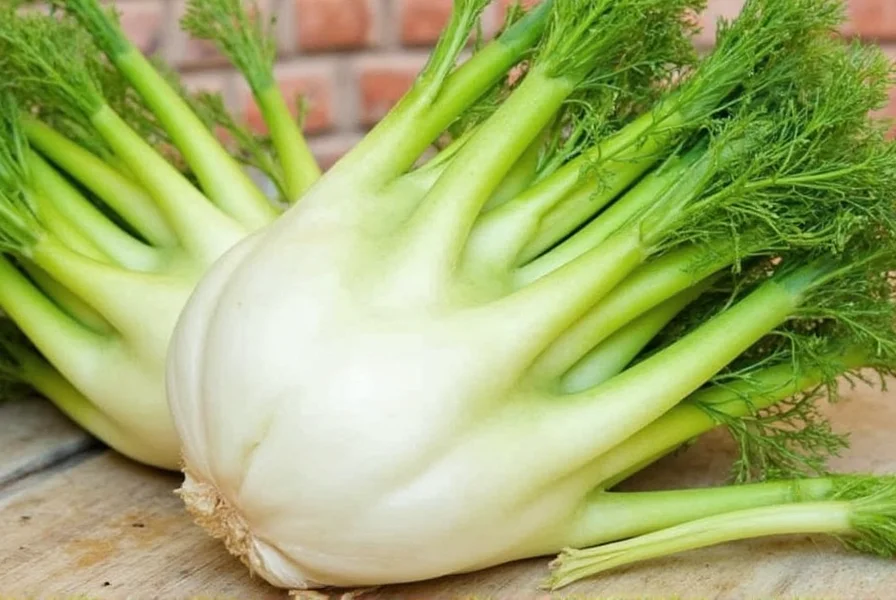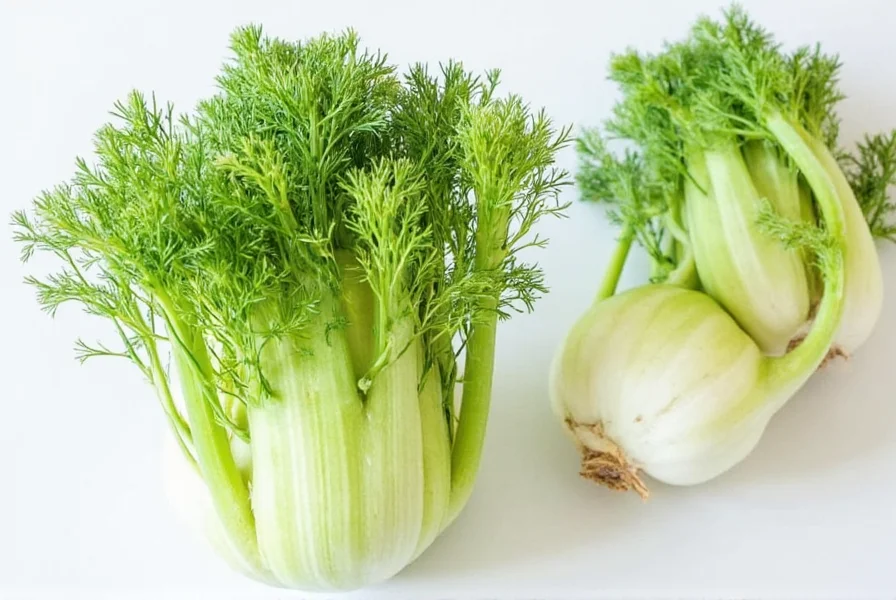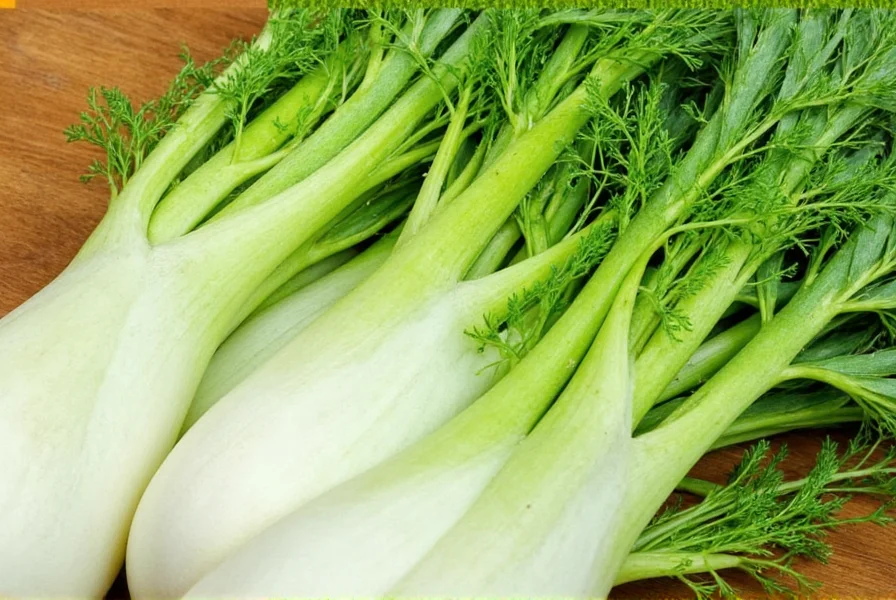Fennel (Foeniculum vulgare) has been valued for both culinary and medicinal purposes since ancient times. This aromatic plant, with its distinctive licorice-like flavor, offers impressive nutritional benefits that make it a valuable addition to a healthy diet. Understanding whether is fennel good for you requires examining its comprehensive nutritional profile and evidence-based health effects.
Nutritional Powerhouse: What Makes Fennel Beneficial
Fennel's nutritional composition explains why is fennel good for you from a scientific perspective. A single cup (120g) of raw fennel bulb provides:
| Nutrient | Amount per Cup | % Daily Value |
|---|---|---|
| Calories | 27 | 1% |
| Fiber | 4.1g | 15% |
| Vitamin C | 12mg | 13% |
| Potassium | 360mg | 10% |
| Folate | 23mcg | 6% |
| Vitamin B6 | 0.1mg | 5% |
| Calcium | 43mg | 3% |
| Magnesium | 15mg | 4% |
What truly sets fennel apart are its unique phytochemicals, particularly anethole, which gives fennel its characteristic flavor and provides potent anti-inflammatory and antioxidant properties. Research published in the Journal of Food Science and Technology confirms that these compounds contribute significantly to fennel's health-promoting effects.

Science-Backed Health Benefits of Fennel
Digestive Health Support
One of the most well-documented answers to is fennel good for digestion is a resounding yes. Clinical studies show fennel can effectively reduce symptoms of irritable bowel syndrome (IBS) and functional dyspepsia. The European Medicines Agency recognizes fennel seed oil as a traditional herbal remedy for digestive issues.
A 2020 review in Phytotherapy Research found that fennel extract significantly reduced abdominal pain and bloating in patients with IBS. The high fiber content in fennel bulb promotes regular bowel movements, while the antispasmodic properties of fennel seeds help relax intestinal muscles.
Anti-Inflammatory and Antioxidant Effects
Fennel contains powerful antioxidants including flavonoids, phenolic compounds, and vitamin C. These compounds combat oxidative stress and reduce inflammation throughout the body. Research in the Journal of Agricultural and Food Chemistry demonstrated that fennel extract inhibited inflammatory markers more effectively than some common anti-inflammatory medications.
Regular consumption of fennel may help reduce the risk of chronic inflammatory conditions including arthritis, heart disease, and certain cancers. This makes understanding fennel health benefits and side effects important for long-term wellness planning.
Cardiovascular Protection
The potassium content in fennel contributes to healthy blood pressure regulation, while the fiber helps manage cholesterol levels. A study published in Nutrition Research found that fennel seed supplementation significantly reduced LDL ("bad") cholesterol and triglycerides in participants with mild hyperlipidemia.
Additionally, the nitrate content in fennel may improve blood vessel function, supporting overall cardiovascular health. These findings provide concrete evidence for those wondering is fennel good for heart health.
Potential Cancer-Protective Properties
Promising research suggests fennel may have cancer-fighting properties. The compound anethole has demonstrated anti-proliferative effects against breast cancer cells in laboratory studies. Research in BMC Complementary Medicine and Therapies indicates that fennel extract may induce apoptosis (programmed cell death) in certain cancer cell lines.
While more human studies are needed, these preliminary findings contribute to the growing body of evidence supporting fennel's role in a cancer-preventive diet.
Understanding Potential Concerns: Fennel Safety Profile
While is fennel good for you for most people, certain considerations are important:
- Allergies: People allergic to plants in the Apiaceae family (carrots, celery, parsley) may react to fennel
- Pregnancy: Large medicinal doses of fennel seeds aren't recommended during pregnancy due to potential uterine stimulation
- Hormone-sensitive conditions: Fennel contains compounds with estrogen-like effects; those with estrogen-receptor positive cancers should consult their doctor
- Medication interactions: Fennel may interact with certain medications including blood thinners and hormone therapies
For most adults, culinary amounts of fennel (both bulb and seeds) are considered safe. The question of is fennel safe to eat daily generally has a positive answer when consumed in food quantities, though medicinal doses should be discussed with a healthcare provider.
Maximizing Fennel's Benefits in Your Diet
To fully benefit from fennel, consider these practical applications:
Culinary Uses for Fennel Bulb
- Raw: Slice thinly for salads (the crisp texture and mild flavor work well)
- Roasted: Brings out natural sweetness; pairs well with root vegetables
- Grilled: Excellent with fish or chicken
- Soup base: Adds depth to broths and stews
Using Fennel Seeds Effectively
- Tea: Steep 1 teaspoon of crushed seeds in hot water for digestive relief
- Spice blends: Essential in Indian, Middle Eastern, and Italian cuisines
- Baking: Adds subtle sweetness to breads and desserts
- Infused oils: Creates flavorful bases for dressings

Fennel vs. Similar Vegetables: Nutritional Comparison
Understanding how fennel compares to related vegetables helps answer is fennel good for you relative to other options:
| Nutrient (per 100g) | Fennel | Celery | Carrots | Cucumber |
|---|---|---|---|---|
| Calories | 31 | 16 | 41 | 15 |
| Fiber | 3.1g | 1.6g | 2.8g | 0.5g |
| Vitamin C | 12mg | 3.1mg | 5.9mg | 2.8mg |
| Potassium | 414mg | 260mg | 320mg | 147mg |
| Unique Compounds | Anethole, estragole | Phthalides | Beta-carotene | Cucurbitacins |
This comparison shows fennel offers superior potassium content compared to similar vegetables and contains unique bioactive compounds not found in celery, carrots, or cucumbers. When evaluating fennel seeds vs bulb nutrition, note that seeds contain higher concentrations of essential oils and fiber but less vitamin C than the bulb.
Practical Guidance: Incorporating Fennel for Optimal Health
For those exploring whether is fennel good for weight loss, research suggests fennel tea may support metabolism and reduce appetite. A study in Complementary Therapies in Medicine found that fennel tea consumption was associated with modest reductions in body weight and waist circumference.
However, fennel should be viewed as part of an overall healthy eating pattern rather than a weight loss miracle. Its low calorie density and high fiber content make it an excellent addition to weight management diets.
When addressing digestive concerns like bloating, many people wonder does fennel help with bloating. Clinical evidence supports using fennel tea or seeds after meals to reduce gas and bloating. The carminative properties of fennel help expel gas from the digestive tract.
Conclusion: Is Fennel Good for You?
The evidence clearly supports that fennel is good for you when consumed as part of a balanced diet. Its impressive nutritional profile, backed by scientific research, demonstrates multiple health benefits with minimal risks for most people. Whether you're interested in fennel health benefits for digestion, cardiovascular support, or overall wellness, this versatile vegetable deserves a regular place on your plate.
As with any dietary change, consult with a healthcare provider if you have specific health conditions or concerns. For most people, incorporating both fennel bulb in meals and fennel tea for digestive support provides the broadest range of benefits while answering the question is fennel good for you with confidence.
Frequently Asked Questions
Can fennel help with digestive issues like bloating?
Yes, fennel is well-documented for its digestive benefits. The compounds in fennel, particularly anethole, have antispasmodic properties that relax intestinal muscles and reduce gas. Clinical studies show fennel tea or seeds consumed after meals can significantly reduce bloating and abdominal discomfort, especially for those with irritable bowel syndrome (IBS).
Is it safe to consume fennel daily?
Culinary amounts of fennel (both bulb and seeds) are generally safe for daily consumption. The bulb can be eaten raw or cooked in regular meals, while 1-2 cups of fennel tea per day is considered safe for most adults. However, medicinal doses (more than 5 grams of seeds daily) should be discussed with a healthcare provider, especially for those with hormone-sensitive conditions.
What's the difference between fennel bulb and fennel seeds nutritionally?
Fennel bulb is higher in vitamin C and water content, making it excellent for hydration and immune support. Fennel seeds contain higher concentrations of essential oils (anethole), fiber, and certain minerals. Seeds have more potent medicinal properties for digestion but lack the vitamin C found in the bulb. Both forms offer unique benefits, so incorporating both provides comprehensive nutritional advantages.
Can fennel interact with medications?
Fennel may interact with certain medications due to its estrogen-like compounds and effects on liver enzymes. It could potentially affect blood thinners, hormone therapies, and some seizure medications. If you take prescription medications regularly, consult your healthcare provider before consuming fennel in medicinal amounts (beyond normal culinary use).
Is fennel safe during pregnancy?
Culinary amounts of fennel (as a vegetable in cooking) are generally considered safe during pregnancy. However, medicinal doses of fennel seeds or concentrated extracts should be avoided as they may stimulate uterine contractions. Pregnant women should consult their healthcare provider before using fennel for therapeutic purposes, especially in the first trimester.











 浙公网安备
33010002000092号
浙公网安备
33010002000092号 浙B2-20120091-4
浙B2-20120091-4